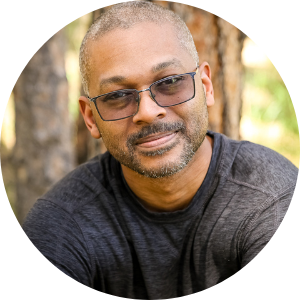Throughout Lent, guest blogger Dr. Junius Johnson will be reflecting on the season through the lens of C.S. Lewis’s great series, The Chronicles of Narnia. We invite you to join him in revisiting this world of childhood imagination even while you prepare your hearts to rejoice again in the salvation Christ worked at the cross.
Loss is our earliest memory as a race. There was a time before the Fall, a time before we gambled all our happiness in hopes to win a happiness beyond the lot of mortals and discovered that the boundaries set to mortal beings are absolute; a time before the terror, astonishment, and above all shame of knowing that we suddenly had a secret from God, one we would give anything not to have to tell Him. But we cannot remember it. We have lost Eden so thoroughly that we don’t even know where it is: the flaming cherubim have long since returned to their other duties, the path to bliss guarded as effectively now by ignorance and forgetfulness.
So powerful is loss that it threatens to destroy the good of possession. Loss empties the world of its savor, deprives events of their meaning, and, if we’re not careful, it will reach back and retroactively deprive the past of its joy. But it is not loss as such; loss is not the great hurt, it is only its herald, that which must be true if the real enemy is to follow. No, the great enemy is grief.
. . . loss is not the great hurt, it is only its herald. . .
Loss is the truth that something has passed beyond the bounds of this world, has become inaccessible to you for as long as you walk the pilgrimage of this life. Grief is the emotional response to that truth; it is the truth as it is taken up for integration into our lives. Loss is objective, grief is subjective: and therefore not less real, but more personal. Loss makes us sad; grief overthrows us.
Grief is common to every human in the world, for loss is the chief punishment for our sin. Our ancestors do not abide; but neither do our spouses, our friends, or our children. The longer we live, the more we lose, for everything is perishing, everything is wasting away. And precisely because it is so characteristically fallen a thing, proper to humans and demons but not, as we suppose, to the blessed angels, we are also tempted to think that it doesn’t belong to God.
In The Magician’s Nephew, Digory goes to Aslan hoping to ask him to provide some means of healing for his dying mother. But before he can say anything, he is accused of being the Breaker of Worlds. He is subjected to Aslan’s interrogation, which is not so much a discovery of truth as a coerced confession, causing Digory to admit for the first time even to himself that all of this evil has come into the world for no better reason than that he was selfish. And his first thought is: “I’ve killed my mom.”
When Aslan turns to him again, he asks if he is ready to make things right. Digory knows this is what he ought to do, that he owes the people of this world. But he’s really in no state for adventures: he’s about to lose his mom. He is pre-grieving her, and he is grieving the lost chance to help her, and he’s just beginning to feel a guilt that he cost his mother her life that would try to crush him for the rest of his life. And so he puts in one tiny plea, and he puts his whole heart into it. So completely does he give himself to his request that he does what before seemed unthinkable: he looks up, into the face of Aslan.
And he saw his grief mirrored there; no, more: he saw the original of which his grief was but a pale copy written there. He saw in that moment that Aslan loved his mother. What he perhaps was in no position to notice at the time was just how much Aslan loved him. Aslan’s heart was not breaking for Digory’s mother, whom he knew he would heal; it was breaking for the grief Digory was feeling. The look of pleading and despair that boy turned on the lion in that moment: what would you feel if your child turned to you in such utter desperation and hopelessness, their whole being united into one impossible wish?
Nothing is more important than what Aslan says next: “My son, my son, I know. Grief is great. Only you and I in this land know that yet. Let us be good to one another.”[1] Digory thinks he is alone, but he is not. He thinks no one in this world or any other knows his pain, which is specific, unique, and unlike any other pain: the loss of your mother is not any other loss of a mother, and even those of us who have felt it cannot therefore say we know your pain. But he is wrong, for there is one who has felt it before he has. There is one who knows the precise magnitude of every grief, and of grief itself, for he has borne them all. There is one who sees Digory and each of us in our grief, and who not only grieves with us, but also grieves over our grief. You are not alone: you are seen, understood, and loved.
There is one who knows the precise magnitude of every grief, and of grief itself, for he has borne them all.
Aslan’s response to grief is goodness, even kindness. Only there is still work to be done. The tree must be planted, because so many thousands of lives depend on it. The healing of Digory’s grief can only come on the other side of completing the quest, doing the work one is called to in the world. But they are not separate: Digory’s mother is healed by fruit from the tree he plants to protect Narnia. Likewise, our griefs are healed from the obedience we offer to God in fulfilling his call for us and in conforming to Jesus, who wore our griefs so much better than we do. We may even be glad to have grieved; for otherwise we should never have known how deep God is prepared to go to come alongside his people.
[1] ch. 12

Junius Johnson is an independent scholar, teacher, musician, and writer. He is the executive director of Junius Johnson Academics, through which he offers innovative classes for both children and adults that aim to marry the sense of wonder with intellectual rigor. An avid devotee of story, he is especially drawn to fantasy, science fiction, and young adult novels. He performs professionally on the french horn and electric bass. He holds a BA from Oral Roberts University (English Lit), an MAR from Yale Divinity School (Historical Theology), and an MA, two MPhils, and a PhD (Philosophical Theology) from Yale University. He is the author of 4 books, including The Father of Lights: A Theology of Beauty. An engaging speaker and teacher, he is a frequent guest contributor to blogs and podcasts on faith and culture, and is a member of The Cultivating Project. Explore his work at juniusjohnson.com.

